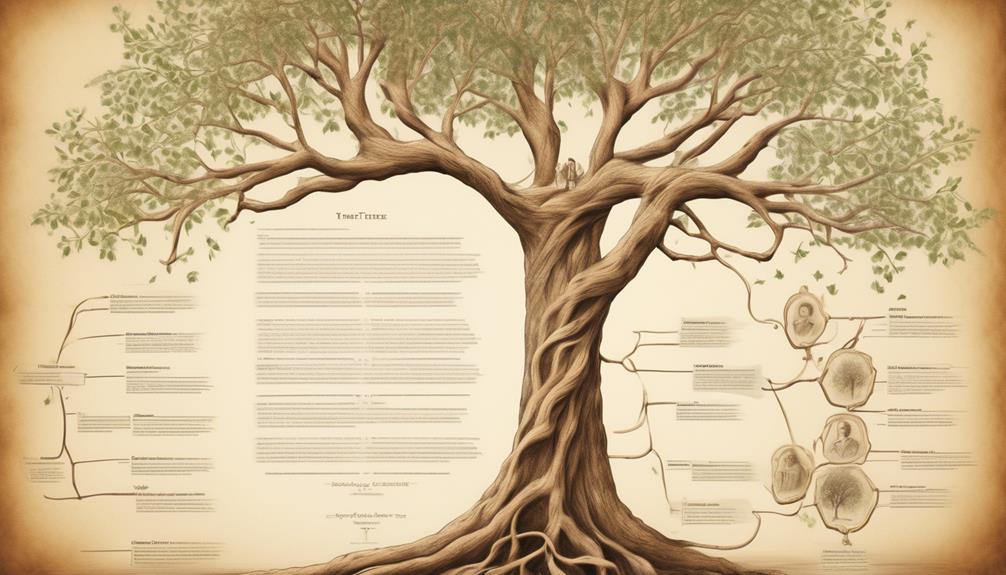Have you ever thought about the subtle differences between a will and a living trust?
The distinction between these two estate planning tools is often a point of confusion for many individuals.
By understanding the fundamental differences and unique benefits of each, you can make informed decisions that align with your specific financial and familial circumstances.
Let's explore how these legal instruments can shape the future of your estate and ensure your wishes are carried out seamlessly.
Key Takeaways
- Living trusts allow asset control in life, wills dictate post-death distribution.
- Living trusts avoid probate, wills often go through probate process.
- Integrating will with living trust aids in comprehensive estate planning.
- Living trusts offer privacy, creditor protection, and efficient asset distribution.
Key Distinctions Between Will and Living Trust
When comparing a will to a living trust, the key distinctions become evident in their handling of asset distribution and probate proceedings. A living trust, whether revocable or irrevocable, offers the grantor control over their assets during their lifetime. In contrast, a will dictates asset distribution and executor appointments after the individual's passing.
The transfer of asset ownership during life is a hallmark feature of living trusts, enabling seamless estate management. One significant advantage of a living trust is its ability to bypass probate court proceedings, unlike wills that often undergo probate. This difference can have practical implications in states like Texas, where living trusts provide enhanced probate avoidance benefits due to specific laws and regulations.
Moreover, when dealing with community property, living trusts are favored as they can mitigate legal challenges that may arise when distributing such assets through a will. Thus, the choice between a will and a living trust hinges on factors like control, transfer mechanisms, and probate considerations.
Advantages and Disadvantages of Wills

One of the most notable aspects of wills is their cost-effectiveness in estate planning, typically being free to create. Here are some advantages and disadvantages of wills to consider:
- Cost-Effective: Wills are usually inexpensive to set up, making them accessible for many individuals looking to plan their estates.
- Modifications: Wills can be easily updated or modified to reflect changing circumstances or preferences, ensuring that your wishes are always current.
- Efficient Estate Settlement: Wills help loved ones efficiently settle your estate by clearly outlining how your assets should be distributed.
- Probate Process: However, one disadvantage is that wills must go through the probate process, which can be time-consuming and costly, potentially delaying the distribution of assets.
It's essential to weigh these advantages and disadvantages carefully when deciding if a will is the right choice for your estate planning needs.
Understanding Living Trust Benefits
Moving from the discussion of the advantages and disadvantages of wills, let's now explore the benefits of living trusts in estate planning. Living trusts offer numerous advantages, including the ability to manage and distribute assets during one's lifetime, avoiding the probate process for asset transfer, maintaining privacy as they do not become public record like wills, and providing protection for assets from creditors. Moreover, living trusts can be structured as either revocable or irrevocable, impacting the level of control over assets.
| Benefit | Description | Impact |
|---|---|---|
| Asset Management | Enables management of assets during one's lifetime. | Facilitates organized asset handling. |
| Probate Avoidance | Helps avoid the lengthy and public probate process for asset transfer. | Saves time and maintains privacy. |
| Asset Protection | Offers protection for assets from creditors. | Safeguards assets from potential risks. |
These benefits make living trusts a valuable tool in estate planning, providing individuals with greater control over their assets, enhanced privacy, and efficient asset distribution mechanisms.
Integrating Will and Living Trust

To ensure a comprehensive approach to estate planning, integrating a will with a living trust can be a strategic and efficient way to manage asset distribution. By combining these two estate planning tools, individuals can create a seamless strategy that covers various aspects of asset management and distribution efficiently. Here are key points to consider:
- Pour-Over Will: Acts as a safety net by directing any assets not transferred to the living trust during the grantor's lifetime into the trust upon their death.
- Asset Distribution: Integrating a will with a living trust helps ensure comprehensive asset distribution and management, reducing the likelihood of assets falling outside the trust.
- Probate Avoidance: This integration strategy can help avoid the need for probate for assets held in the living trust, streamlining the distribution process.
- Comprehensive Approach: Overall, combining a will and a living trust provides a comprehensive solution for estate planning, offering a streamlined and efficient way to manage asset distribution.
Making an Informed Estate Planning Choice
When considering estate planning options, it is crucial to make an informed choice between a will and a living trust based on your specific needs and goals. Both wills and living trusts serve different purposes and offer unique benefits. To help you decide which option aligns best with your objectives, we have outlined key factors to consider in the table below:
| Aspect | Living Trust | Will |
|---|---|---|
| Probate Court | Often avoids probate | Requires probate |
| Privacy | Maintains privacy | Becomes public record |
| Asset Protection | Offers protection from | Limited protection from |
| creditors | creditors |
Carefully evaluating these aspects can guide your estate planning decisions towards either avoiding probate, ensuring privacy, seeking asset protection, or simplifying asset management. By understanding the differences between wills and living trusts, you can make a well-informed choice that aligns with your estate planning goals and safeguards your assets and beneficiaries.
Frequently Asked Questions
Why a Living Trust Is Better Than a Will?
When considering why a living trust is better than a will, it's essential to understand the benefits it offers.
A living trust allows assets to bypass probate court, ensuring swift asset distribution. Privacy is maintained as living trusts aren't public records. They also provide flexibility in managing and distributing assets, along with the ability to manage assets in case of incapacity.
These advantages make a living trust a superior choice in estate planning.
What Is the Downside of a Living Trust?
Downsides of a living trust can include the potential complexity and cost of creation compared to wills, lack of tax benefits present in certain irrevocable trusts, inability to designate guardianship for minor children, and the time-consuming process of transferring assets into the trust.
Additionally, assets held in a living trust are viewed as trust property, not individual property. These factors should be considered when deciding between a living trust and a will.
What Assets Cannot Be Placed in a Trust?
Some assets, like IRAs and government benefits, can't be placed into a living trust. Health Savings Accounts and specific insurance policies are generally ineligible. Personal injury settlements and some retirement benefits may not be suitable for trust inclusion. Assets needing ongoing management or with legal restrictions mightn't transfer well.
It's crucial to understand which assets can't be placed in a trust to ensure proper estate planning.
What Is the Basic Difference Between a Will and a Trust?
The basic difference between a will and a trust is like comparing a blueprint to a fully constructed building. Wills dictate asset distribution only after death, while trusts manage assets during our lifetime.
Wills often go through probate court, but trusts can bypass this process. Trusts offer more control and privacy, especially with revocable trusts. Both serve important roles, but trusts provide ongoing management, making them a versatile estate planning tool.
Conclusion
In conclusion, when it comes to estate planning, the choice between a will and a living trust ultimately depends on individual needs and goals.
By understanding the key distinctions and advantages of each option, one can make an informed decision to ensure their assets are distributed according to their wishes.
So, whether you opt for a will or a living trust, it's crucial to take the necessary steps now to secure your legacy for the future.









